กริยา 3 ช่องในภาษาอังกฤษ ผันยังไงให้ถูกต้อง
คุณเคยรู้สึกสับสนกับการผันกริยาภาษาอังกฤษหรือไม่? เช่น ทำไม "go" ต้องกลายเป็น "went" ในอดีต หรือทำไมถึงต้องใช้ "gone" ในบางสถานการณ์? การสร้างประโยคที่ถูกต้องในภาษาอังกฤษจำเป็นต้องเข้าใจเรื่อง กริยา 3 ช่อง ให้ถ่องแท้ เพราะนี่คือหัวใจสำคัญของการสื่อสารที่ชัดเจนและน่าเชื่อถือ
กริยา 3 ช่อง หมายถึงรูปแบบของ คํากริยา อังกฤษ ที่เปลี่ยนไปตามกาลเวลา ประกอบด้วย verb 1 (รูปพื้นฐาน), verb 2 (รูปอดีต) และ verb 3 (Past Participle) ซึ่งเป็นความรู้พื้นฐานที่จำเป็นสำหรับการสร้างประโยคในทุกระดับ
การเรียนรู้เรื่อง กริยา 3 ช่อง ไม่ได้จำกัดอยู่แค่การท่องจำคำเท่านั้น แต่ยังรวมถึงความเข้าใจในการนำไปใช้อย่างถูกต้องในบริบทต่างๆ เช่น การเล่าเรื่องในอดีตด้วย Past Simple ที่ใช้ v2 การพูดถึงประสบการณ์ด้วย Present Perfect ที่ใช้ have/has + v3 หรือการสร้างประโยค Passive Voice ที่ต้องใช้ ช่อง สาม เป็นส่วนสำคัญ
ในภาษาอังกฤษ เราแบ่งกริยาออกเป็น 2 กลุ่มหลักคือ กริยาผันปกติ (Regular Verbs) ที่เพียงเติม "-ed" และกริยาผันไม่ปกติ (Irregular Verbs) ที่มีรูปแบบเฉพาะ เช่น go v2 เป็น "went" และ go ช่อง 3 เป็น "gone" หรือ eat v3 เป็น "eaten" ซึ่งต้องอาศัยการจดจำและฝึกฝน
บทความนี้จะพาคุณเจาะลึกตั้งแต่กฎพื้นฐานของการผันกริยา ตัวอย่างการใช้ verb 1 2 3 ในประโยค ไปจนถึงเทคนิคการจำกริยาผันไม่ปกติที่ใช้บ่อยอย่าง break ช่อง 2, bring ช่อง 2, buy v2, buy v3, learn v3, lose v3, make v3, take v3, know v3, find v3, do v3 และอื่นๆ
เมื่อคุณเข้าใจและจดจำ กริยา 3 ช่อง ได้อย่างแม่นยำ คุณจะสามารถสื่อสารภาษาอังกฤษได้อย่างมั่นใจและเป็นธรรมชาติมากขึ้น ไม่ว่าจะพูด ฟัง อ่าน หรือเขียน เริ่มทำความเข้าใจกับหลักการพื้นฐานนี้ไปด้วยกัน และพร้อมที่จะพัฒนาทักษะภาษาอังกฤษอย่างก้าวกระโดด!

I. กริยา 3 ช่องคืออะไร?
กริยา 3 ช่อง คือรูปแบบการผันคำกริยาในภาษาอังกฤษเพื่อแสดงช่วงเวลา (Tense) ที่แตกต่างกัน แบ่งเป็น verb 1 (รูปพื้นฐาน), verb 2 (รูปอดีต) และ verb 3 (รูปกริยาช่องที่ 3 หรือ Past Participle)
การเข้าใจ กริยา 3 ช่อง เปรียบเสมือนกุญแจที่จะไขประตูสู่การสร้างประโยคที่ถูกต้องตามหลักไวยากรณ์ ไม่ว่าคุณจะต้องการสื่อสารในช่วงเวลาปัจจุบัน อดีต หรืออนาคต หรือแม้แต่การสร้างประโยคที่ซับซ้อนยิ่งขึ้น
II. กลุ่มกริยาผันปกติ (Regular Verbs)
กริยาผันปกติใน verb 1 2 3 มีหลักการง่ายๆ คือการเติม "-ed" ที่ verb 1 เพื่อสร้าง verb 2 และ verb 3 ซึ่งจะมีรูปเหมือนกัน
|
Verb 1 |
Verb 2 |
Verb 3 |
ความหมาย |
|
work |
worked |
worked |
ทำงาน |
|
play |
played |
played |
เล่น |
|
talk |
talked |
talked |
พูด |
|
walk |
walked |
walked |
เดิน |
|
watch |
watched |
watched |
ดู |
|
listen |
listened |
listened |
ฟัง |
|
learn |
learned |
learned |
เรียนรู้ |
|
help |
helped |
helped |
ช่วยเหลือ |
|
want |
wanted |
wanted |
ต้องการ |
|
need |
needed |
needed |
จำเป็น |
|
cook |
cooked |
cooked |
ทำอาหาร |
|
clean |
cleaned |
cleaned |
ทำความสะอาด |
|
wash |
washed |
washed |
ล้าง |
|
start |
started |
started |
เริ่มต้น |
|
end |
ended |
ended |
จบ |
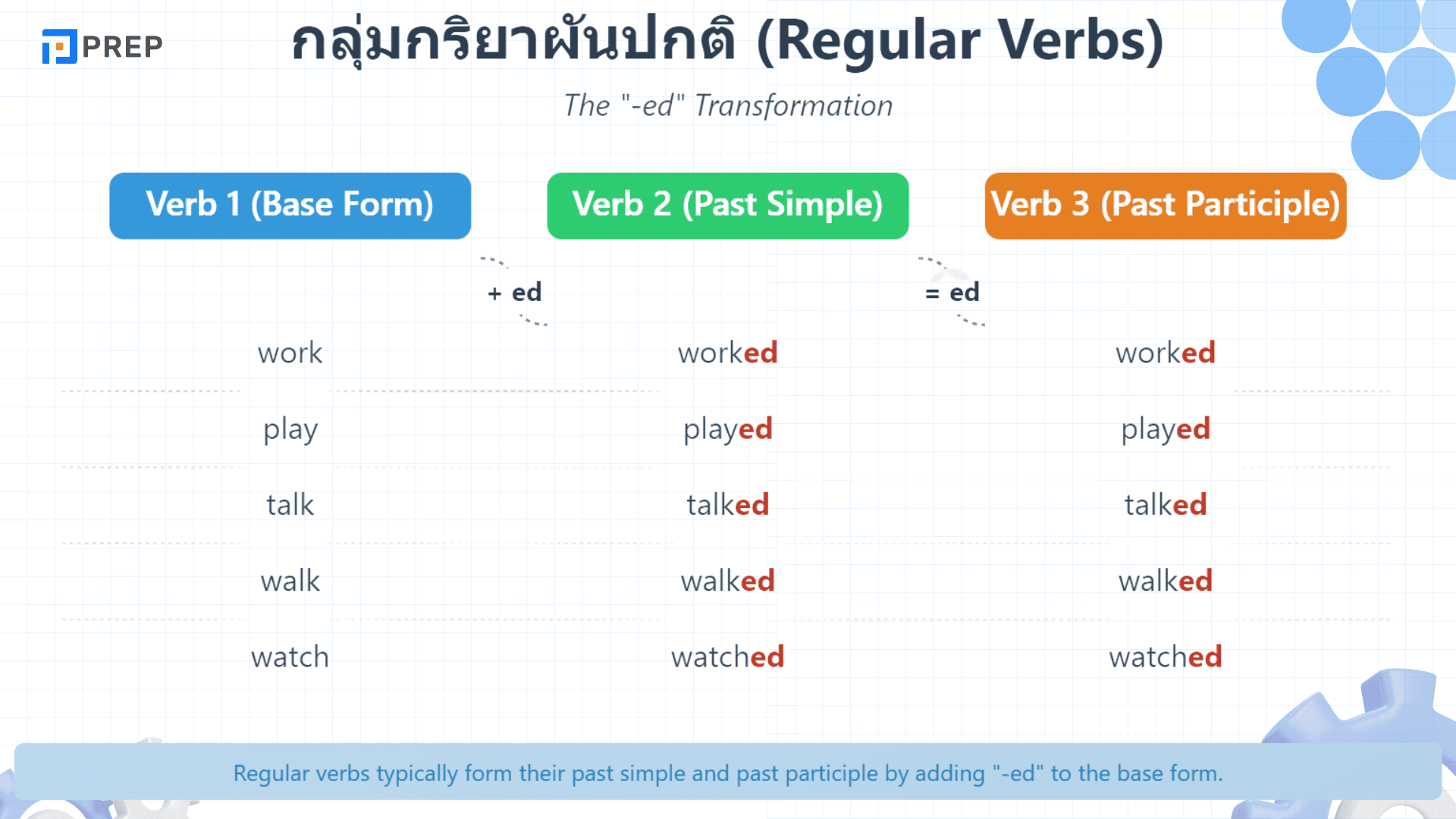
แต่มีข้อยกเว้นที่ควรระวังเมื่อเติม "-ed":
-
ถ้า verb ลงท้ายด้วย "e" ให้เติมเพียง "d" เช่น like → liked, smile → smiled
-
ถ้า คำ กริยา ลงท้ายด้วยพยัญชนะ + y ให้เปลี่ยน y เป็น i แล้วเติม "ed" เช่น study → studied, try → tried
-
ถ้ากริยาลงท้ายด้วยพยัญชนะตัวเดียวที่มีสระเสียงสั้นอยู่หน้า ให้เพิ่มพยัญชนะตัวสุดท้ายอีก 1 ตัว เช่น stop → stopped, plan → planned
III. กลุ่มกริยาผันไม่ปกติ (Irregular Verbs)
กริยาผันไม่ปกติไม่เป็นไปตามกฎการเติม "-ed" ทำให้รูป verb 2 และ verb 3 มีการเปลี่ยนแปลงที่ต้องจำเป็นพิเศษ แต่เราสามารถแบ่งกลุ่มเพื่อให้จำง่ายขึ้นได้ดังนี้:
1. กลุ่มที่ทั้ง 3 ช่องเหมือนกัน
|
Verb 1 |
Verb 2 |
Verb 3 |
ความหมาย |
|
cut |
cut |
cut |
ตัด |
|
put |
put |
put |
วาง |
|
read* |
read* |
read* |
อ่าน |
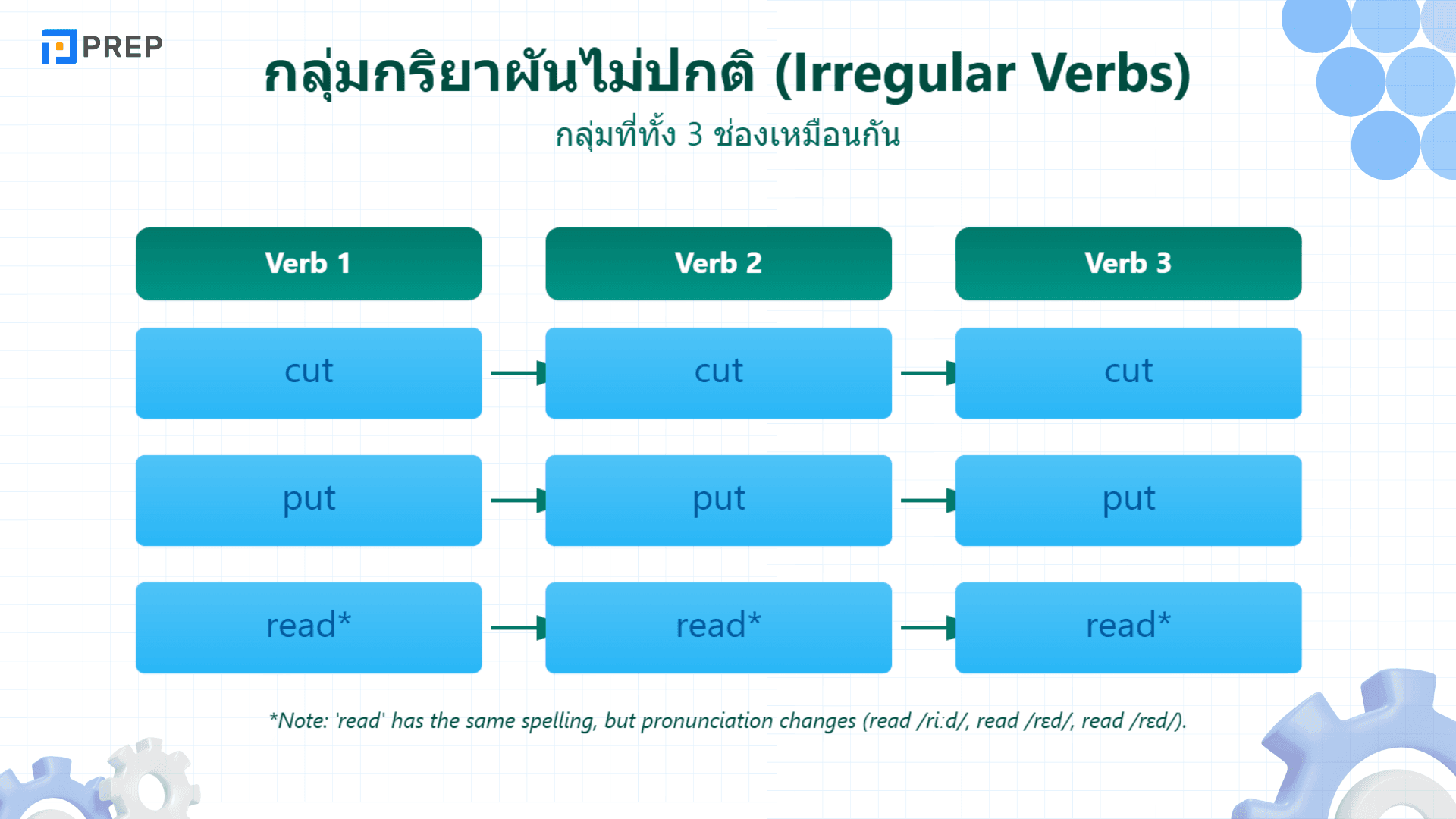
*อ่านออกเสียงต่างกัน: V1 = /riːd/, V2 และ V3 = /red/
2. กลุ่มที่ช่อง 2 และ 3 เหมือนกัน
|
Verb 1 |
Verb 2 |
Verb 3 |
ความหมาย |
|
buy |
buy v2 (bought) |
buy v3: bought |
ซื้อ |
|
build |
built |
build v3: built |
สร้าง |
|
find |
found |
find v3: found |
พบ |
|
bring |
ช่อง 2: brought |
brought |
นำมา |
|
lose |
lost |
lose v3: lost |
ทำหาย |
|
try |
try ช่อง 2: tried |
tried |
พยายาม |
3. กลุ่มที่ทั้ง 3 ช่องต่างกัน
|
Verb 1 |
Verb 2 |
Verb 3 |
ความหมาย |
|
go |
go v2: went |
go ช่อง 3: gone |
ไป |
|
do |
do ช่อง 2: did |
do ช่อง 3: done |
ทำ |
|
eat |
ate |
eat v3: eaten |
กิน |
|
take |
took |
take v3: taken |
เอา, นำ |
|
break |
break ช่อง 2: broke |
broken |
ทำแตก |
|
drink |
drank |
drink ช่อง 3: drunk |
ดื่ม |
|
know |
knew |
know v3: known |
รู้ |
|
make |
made |
make v3: made |
ทำ, สร้าง |
4. กลุ่มที่ช่อง 1 และ 3 เหมือนกัน
|
Verb 1 |
Verb 2 |
Verb 3 |
ความหมาย |
|
come |
came |
come |
มา |
|
run |
ran |
run |
วิ่ง |
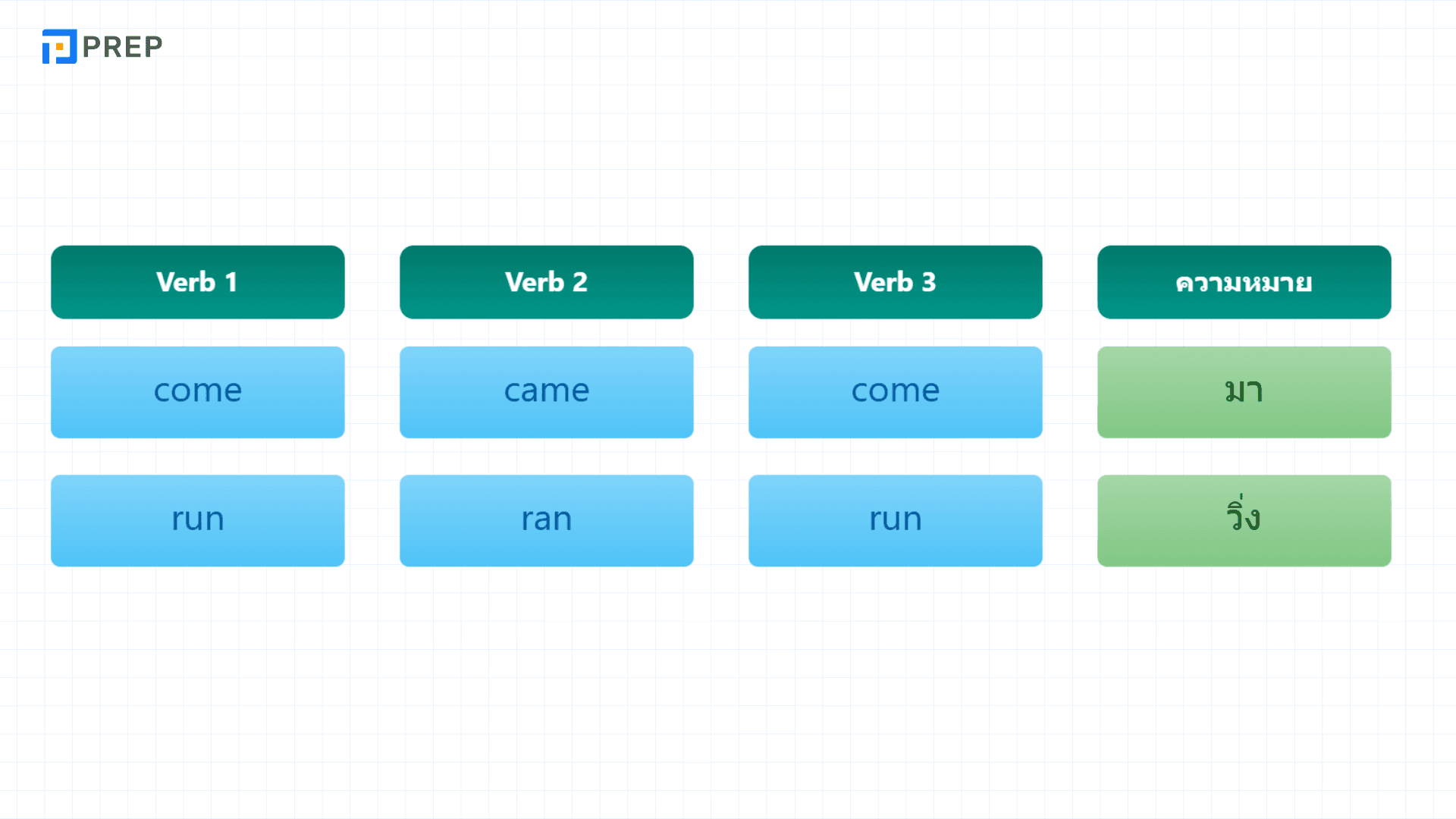
5. เทคนิคการจำ Irregular Verbs
การจำ กริยา 3 ช่อง ที่ผันไม่ปกติอาจเป็นเรื่องยาก แต่ด้วยเทคนิคต่อไปนี้ จะช่วยให้คุณจดจำได้ดีขึ้น:
-
จำเป็นกลุ่ม - แบ่งตามรูปแบบการผันที่คล้ายกัน เช่น buy-bought-bought, bring-brought-brought มีเสียง "ought" เหมือนกัน
-
ใช้บัตรคำ (Flashcards) - เขียน verb 1 ด้านหนึ่ง และ v2 กับ v3 อีกด้าน
-
สร้างประโยค - ฝึกใช้กริยาในประโยคจริง เช่น "I eat (V1) breakfast every day. Yesterday, I ate (V2) rice. I have eaten (V3) already."
-
ใช้เพลงหรือเกม - มีแอปและเกมมากมายที่ช่วยให้การจำสนุกขึ้น
IV. การนำกริยา 3 ช่องไปใช้ใน Tenses ต่างๆ
1. การใช้ Verb 1 (Base Form)
Verb 1 ใช้ในกรณีต่อไปนี้:
|
Tense / โครงสร้าง |
รูปแบบการใช้ |
ตัวอย่างประโยค |
|
S + V1 (+ s/es สำหรับประธานเอกพจน์บุรุษที่ 3) |
They work every day. (พวกเขาทำงานทุกวัน) She works at a hospital. (เธอทำงานที่โรงพยาบาล) |
|
|
S + will/shall + V1 |
I will go to Bangkok next week. (ฉันจะไปกรุงเทพฯ สัปดาห์หน้า) |
|
|
S + Modal + V1 |
You should study more. (คุณควรเรียนให้มากขึ้น) They can swim very well. (พวกเขาว่ายน้ำได้ดีมาก) |
|
|
Imperative |
V1 + ... |
Open the window, please. (เปิดหน้าต่างหน่อย) Listen to me! (ฟังฉันหน่อย! |
2. การใช้ Verb 2 (Past Simple)
Verb 2 หรือ ช่อง 2 ใช้ในกรณีต่อไปนี้:
|
Tense / โครงสร้าง |
รูปแบบการใช้ |
ตัวอย่างประโยค |
|
S + V2 |
I worked late yesterday. (เมื่อวานฉันทำงานดึก) |
|
|
She read a book last night. (เธออ่านหนังสือเมื่อคืน) |
||
|
They went to the market. (พวกเขาไปตลาด) |
||
|
S + was/were + V-ing |
While I was studying, he called. (ขณะที่ฉันกำลังเรียน เขาโทรมา) |
|
|
S + had + V3 |
I had finished before you came. (ฉันทำเสร็จแล้วก่อนคุณมา) |
|
|
If + S + V2, S + would + V1 |
If I knew her name, I would tell you. (ถ้าฉันรู้ชื่อเธอ ฉันจะบอกคุณ) |
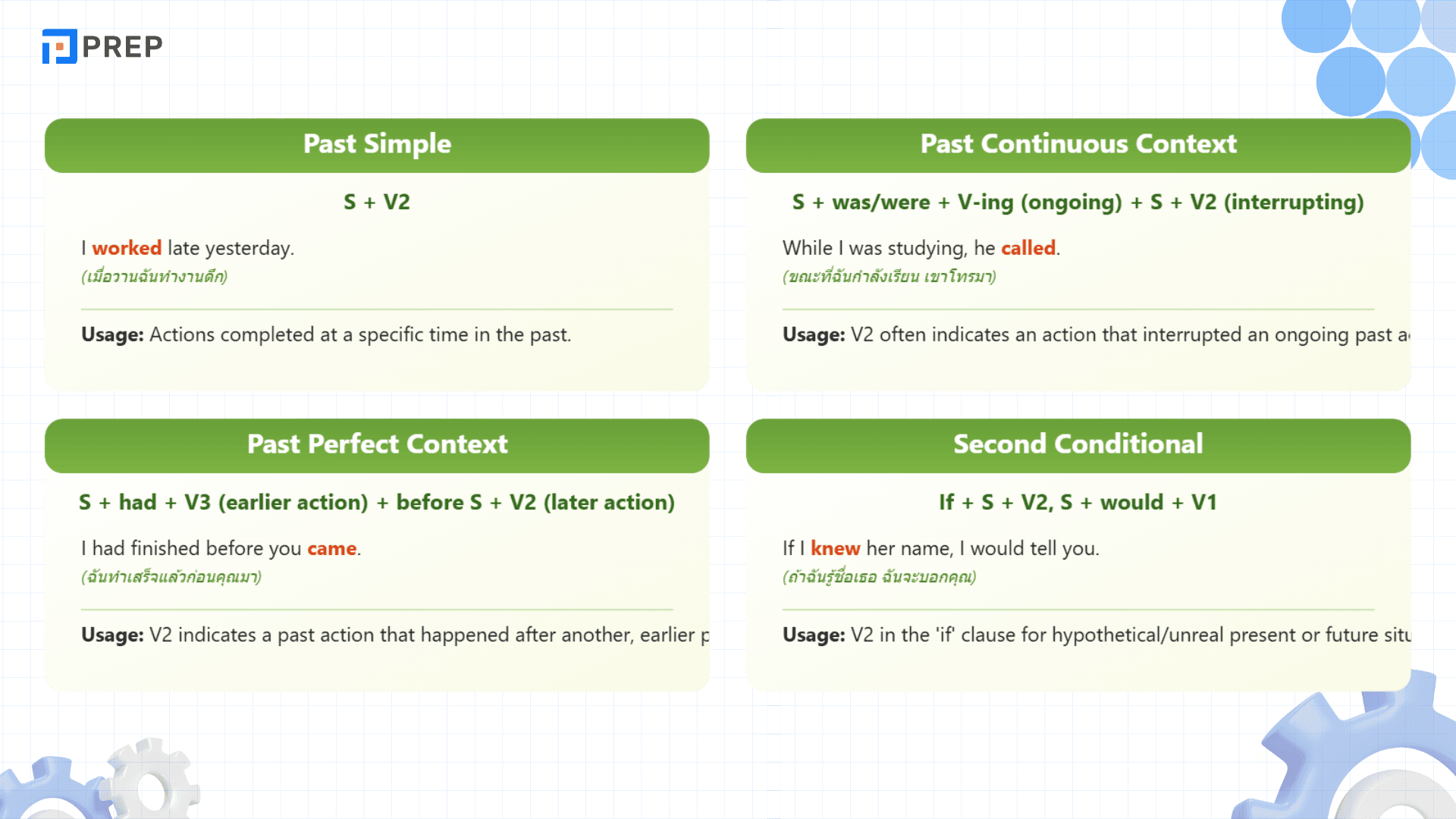
3. การใช้ Verb 3 (Past Participle)
Verb 3 หรือ ช่อง สาม ใช้ในกรณีต่อไปนี้:
|
Tense / โครงสร้าง |
รูปแบบการใช้ |
ตัวอย่างประโยค |
|
S + have/has + V3 |
I have eaten already. (ฉันกินแล้ว) |
|
|
She has gone home. (เธอกลับบ้านไปแล้ว) |
||
|
S + had + V3 |
We had finished before the rain. (เราทำเสร็จก่อนฝนตก) |
|
|
S + will have + V3 |
I will have completed this by tomorrow. (ฉันจะทำสิ่งนี้เสร็จภายในวันพรุ่งนี้) |
|
|
S + is/am/are/was/were + V3 |
The house was built in 1995. (บ้านถูกสร้างในปี 1995) |
|
|
This book is written by a famous author. (หนังสือเล่มนี้เขียนโดยนักเขียนที่มีชื่อเสียง) |
||
|
Perfect Modal |
S + Modal + have + V3 |
She must have forgotten about it. (เธอคงลืมมันไปแล้ว) |
|
V3 + Noun |
He gave me written directions. (เขาให้คำแนะนำที่เขียนไว้กับฉัน) |
|
|
The broken vase was expensive. (แจกันที่แตกนั้นมีราคาแพง) |
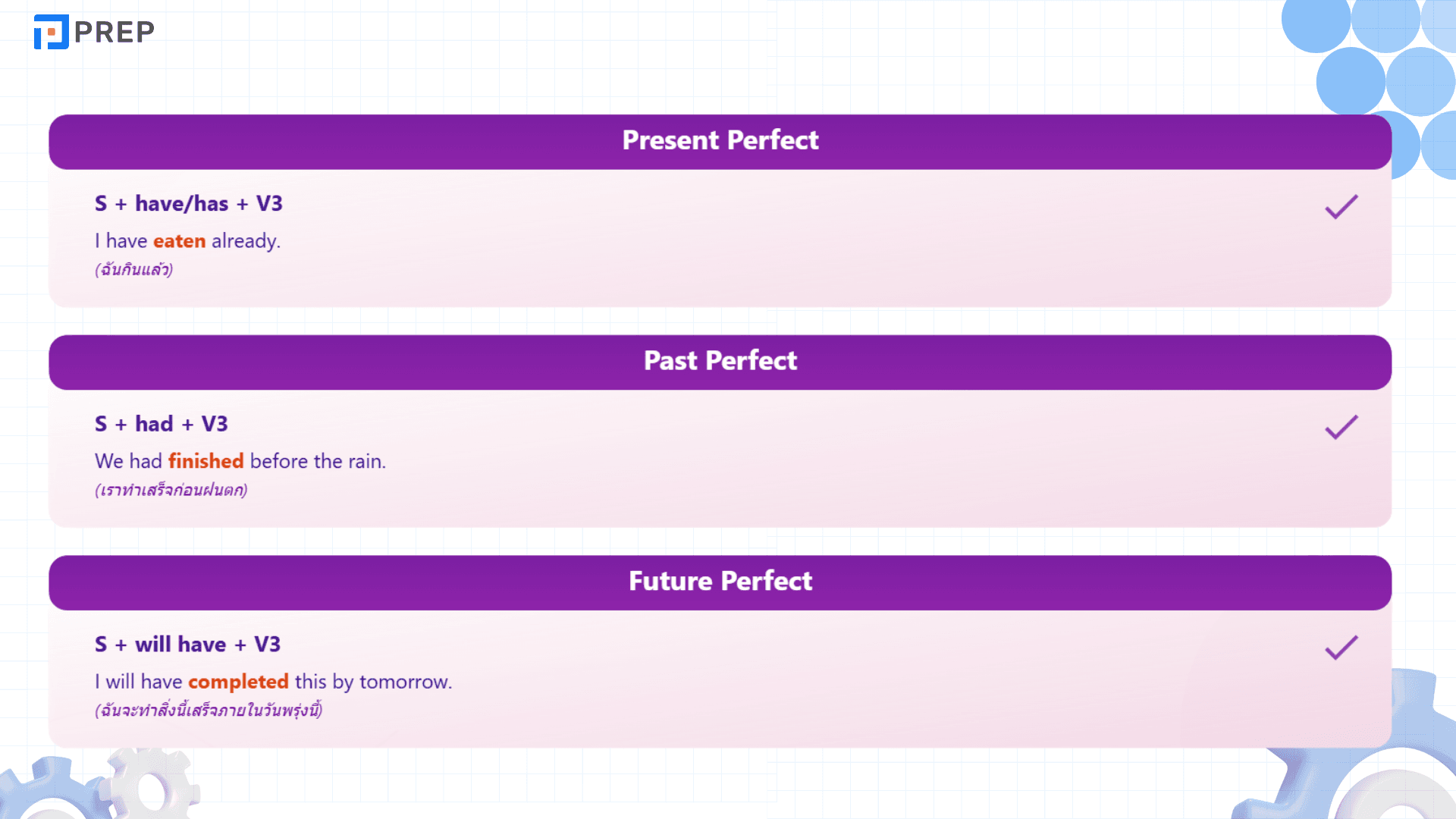
V. มุมมองเชิงภาษาศาสตร์และข้อควรระวัง
ในประวัติศาสตร์ภาษาอังกฤษ กริยาผันไม่ปกติส่วนใหญ่มาจาก "Strong Verbs" ในภาษาอังกฤษโบราณ ที่เปลี่ยนเสียงสระภายในคำเมื่อผันรูป ไม่ใช่การเติมหางเสียงอย่างกริยาผันปกติ (Weak Verbs)
มีกริยาบางตัวที่มีความหมายเปลี่ยนไปเมื่อผันช่อง เช่น:
-
hang (แขวน) → hung (แขวน/ห้อย) → hung (แขวน/ห้อย) แต่ถ้าหมายถึงการแขวนคอประหารชีวิต: hang → hanged → hanged
ข้อควรระวัง คำกริยาที่สับสนและใช้ผิดบ่อย:
-
lie (นอน) / lay (วาง)
-
rise (ลุกขึ้น) / raise (ยกขึ้น)
-
affect (มีผลกระทบ) / effect (ผล)
บทความแนะนำอ่านเพิ่มเติม:
VI. คำถามที่พบบ่อย (FAQs)
1. กริยาแท้และกริยาไม่แท้เกี่ยวข้องกับกริยา 3 ช่องอย่างไร?
กริยาแท้ (Finite Verbs) คือกริยาที่ผันตามประธานและแสดงเวลา ซึ่งจะใช้รูป verb 1 หรือ verb 2 ส่วนกริยาไม่แท้ (Non-finite Verbs) ไม่ผันตามประธานหรือเวลา มักจะอยู่ในรูป Infinitive (to + verb 1) หรือ Participle (verb 3 หรือ V-ing)
2. จำเป็นต้องท่องจำกริยา 3 ช่องทุกตัวในภาษาอังกฤษหรือไม่?
ไม่จำเป็น แต่ควรจำกริยาที่ใช้บ่อยประมาณ 50-100 ตัว เช่น go, do, make, take, come, see, know, get เป็นต้น ส่วนกริยาอื่นๆ ค่อยๆ เรียนรู้เพิ่มเติมผ่านการใช้งานจริง
3. นอกจากการแบ่งตามรูปแบบการผัน V1 V2 V3 แล้ว เราสามารถแบ่งกลุ่ม Irregular Verbs ได้อีกหรือไม่?
ได้ เราสามารถแบ่งตามเสียงสระที่เปลี่ยนไป เช่น:
-
กลุ่ม i-a-u: drink-drank-drunk, sing-sang-sung, swim-swam-swum
-
กลุ่ม i-o-i: give-gave-given, forgive-forgave-forgiven
-
กลุ่ม ea-o-o: speak-spoke-spoken, steal-stole-stolen
4. การเรียนกริยา 3 ช่องในภาษาอังกฤษ ยากหรือง่ายกว่าการผันกริยาในภาษาอื่นอย่างไร?
ภาษาอังกฤษมีการผันกริยาที่ง่ายกว่าหลายภาษา เช่น ภาษาฝรั่งเศส สเปน หรือเยอรมัน เพราะไม่ต้องผันตามเพศและจำนวนของประธานในทุกกาล แต่ความท้าทายของภาษาอังกฤษคือการจดจำกริยาผันไม่ปกติที่ไม่มีรูปแบบตายตัว
การเรียนรู้ กริยา 3 ช่อง อาจดูเป็นเรื่องยากในตอนแรก แต่ด้วยการฝึกฝนอย่างต่อเนื่องและใช้เทคนิคการจำที่เหมาะกับตัวคุณ คุณจะสามารถเอาชนะความท้าทายนี้ได้
ความเข้าใจเรื่อง กริยา 3 ช่อง จะช่วยให้คุณสื่อสารภาษาอังกฤษได้อย่างถูกต้อง มั่นใจ และเป็นธรรมชาติ ไม่ว่าจะเป็นการพูด การเขียน หรือการฟัง
จำไว้ว่าความสำเร็จในการเรียนภาษามาจากการเรียนรู้อย่างสม่ำเสมอ การนำไปใช้ในชีวิตจริง และไม่กลัวที่จะผิดพลาด เริ่มต้นวันนี้ แล้วคุณจะพบว่า กริยา 3 ช่อง ไม่ใช่อุปสรรคอีกต่อไป แต่เป็นพื้นฐานสำคัญที่จะพาคุณไปสู่การเป็นผู้เชี่ยวชาญภาษาอังกฤษในอนาคต
การเรียน IELTS ออนไลน์ไม่เคยง่ายขนาดนี้มาก่อนกับ PREP Education แพลตฟอร์มการเรียนและฝึกสอบอัจฉริยะด้วย AI ด้วยเทคโนโลยี AI พิเศษจาก PREP คุณสามารถเรียนออนไลน์ที่บ้านได้อย่างมีประสิทธิภาพ พร้อมผ่านการฝึกอบรมที่เหมาะสมในการเรียน IELTS อย่างเต็มที่ นอกจากนี้ นักเรียนยังได้รับการช่วยเหลือจาก Teacher Bee AI ผู้ช่วยเสมือนที่จะช่วยตอบคำถามและร่วมเดินทางไปกับคุณตลอดกระบวนการเรียนรู้แบบตัวต่อตัว คลิกที่นี่ หรือโทร HOTLINE +6624606789 เพื่อขอคำปรึกษาเกี่ยวกับหลักสูตร IELTS ที่เหมาะสมกับคุณ! ดาวน์โหลดแอป PREP ทันที เพื่อเริ่มต้นการเรียน IELTS ที่บ้านด้วยโปรแกรมการฝึกสอบออนไลน์คุณภาพสูง

สวัสดีค่ะ ฉันชื่อมุก ปัจจุบันดูแลด้านเนื้อหาผลิตภัณฑ์ของ Prep Education ค่ะ
ด้วยประสบการณ์มากกว่า 5 ปีในการเรียน IELTS ออนไลน์ด้วยตนเอง ฉันเข้าใจดีถึงความท้าทายที่ผู้เรียนต้องเผชิญ แล้วก็รู้ว่าอะไรที่มันเวิร์ก
มุกอยากเอาประสบการณ์ตรงนี้มาช่วยแชร์ แล้วก็ซัพพอร์ตเพื่อน ๆ ให้ได้คะแนนที่ดีที่สุดค่ะ
ความคิดเห็น
เนื้อหาแบบพรีเมียม
ดูทั้งหมดแผนการเรียนรู้ส่วนบุคคล
อ่านมากที่สุด
ติดต่อ Prep ผ่านโซเชียล
















